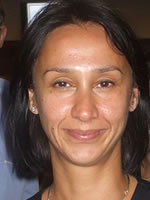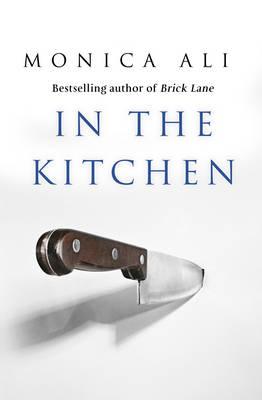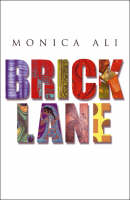In the kitchen with Monica Ali
 One of the most familiar names at the 2009 Auckland Writers and Readers Festival was Monica Ali. In a serious, sensible and enlightening interview, Joyce Fraser spoke with the literary high-flyer about her new book In the kitchen, workplaces, dislocation, libraries and custard.
One of the most familiar names at the 2009 Auckland Writers and Readers Festival was Monica Ali. In a serious, sensible and enlightening interview, Joyce Fraser spoke with the literary high-flyer about her new book In the kitchen, workplaces, dislocation, libraries and custard.
- You did research for a year before writing In the kitchen. Can you give us a rough timeline from when you first got the idea for the novel, the research and then the publishing process?
- I first started thinking about this book in 2002, when I’d first handed in the manuscript for Brick lane, and it was something that was on the backburner to use a kitchen metaphor, for a while it was simmering away. I wrote another book in the meantime and then I spent a year doing the research intensively but I’d been thinking about it and reading around it for longer than that. So it has been something of a journey, it took two years of solid writing as well but I guess the book is a journey, it is about an emotional journey that the protagonist takes, so it feels fair enough that I undertake something gruelling.
- So you’ve mirrored and experienced the same torturous unravelling as your character?! The tension for your main character certainly mounts up as the novel progresses, the novel starts in a nice leisurely way as you are explaining the setting and your characters are being established but as the novel progresses you get a real sense of Gabriel twisting and turning, absolutely trapped and almost frenzied.
- Yes the pace, the intensity, has to mirror his inner turmoil but in the end of the book I think what he is left with, although his life has been torn apart in some ways, is hope. I used last night the metaphor of custard, he has been brought up to the boil, he is unravelling, forced to question everything, the way he looks at life, the values he holds, what is important around him but through that there is a process of re-engagement, in terms of his family life. Although he goes through all this turmoil, I'd hate to give the impression that this is a pessimistic book, I think it looks at some really tough questions both on a personal level and a social level but actually I think it is quite an optimistic, sunny book in the end. Well that is how I feel about it.
 One of the reviews I read recently about In the kitchen saw identity as being a major theme within the book, both for the main character Gabe and for the other characters populating the kitchen, people in a state of transition who have left their country, who have often left a profession, often qualified and esteemed to start a new life at a different stratum of society. Even the hotel itself is uncertain of its identity, the Imperial seems to be trapped in the past and it hasn’t really established itself in the present. What are the issues around identity that interest you and seem relevant to society today?
One of the reviews I read recently about In the kitchen saw identity as being a major theme within the book, both for the main character Gabe and for the other characters populating the kitchen, people in a state of transition who have left their country, who have often left a profession, often qualified and esteemed to start a new life at a different stratum of society. Even the hotel itself is uncertain of its identity, the Imperial seems to be trapped in the past and it hasn’t really established itself in the present. What are the issues around identity that interest you and seem relevant to society today?- Oh, so much interests me about identity, I guess that is a constant running through my work so far. I was interested in the question of story, the kitchen setting is a really rich source of diverse stories, the way in which other peoples stories although they can be enriching, can also be overwhelming and kind of exhausting. Gabriel doesn’t really want to know in the beginning about the backgrounds of his staff, he might have to fire someone and knowing their past would make that difficult. He is running a business. Gabriel is also grappling with his own story, his own life history and as he looks at that more closely he comes to realise he has made numerous post-hoc rationalisations about why he is where he is in his life.
- His own story becomes stretched quite thinly, the fabric of that story has so many holes in it and I think that the question about story runs through not only at that personal level and in terms of how it works in society as a whole, so for example, the economy, Gabriel thinks his Father’s view of the economy is really naïve, believing the whole country is living on tick. Fairweather (Member of Parliament and financial backer for Gabriel’s own proposed restaurant), gives the more sophisticated version, saying you could tell a story of the economy like your father does or you can construct a different version about the strength of the financial sector and it doesn’t matter whichever political narrative suits you, it is about what you can get out of it personally. In the end reality does come around and bite you on the bum and it does so for Gabriel in the end and he is forced to re-evaluate his own stories.
- I found the section of the novel where Gabe’s sister Jenny makes revelations about their Mother and the fact Gabe thought of his Mother as this vibrant, eccentric, "I’ll do it, I feel like it" kind of person and then to find out she had bipolar, it seems in terms of who he thinks he is, he is on constantly shifting ground.
- Exactly, he has closed his eyes to things, what does that mean for who he thinks he really is. Another example is that he swore to himself that he didn’t care about Michelin stars, he told himself he never wanted that but Jenny reminds him that actually in the early days he desperately wanted them. We all do this, we make up reasons to support why we haven’t achieved certain things. That is fair enough to make an accommodation with reality but sometimes you have to look at that closely. I think his relationship with Jenny is quite important, he is quite dismissive of her, slightly patronising.
- He thinks she has settled for less. She has the same friends from childhood which Gabe comes to regret, the loss of his childhood friends. He’s made himself constantly busy to fill the void. He comes to realise that Jenny’s friends aren’t just friends but also witnesses to her life, giving a solidity to her life. So when Gabriel starts out at the beginning of the book he feels that he is in this modern, metropolitan, multicultural society and that the fact he is kind of geographically unbound, with no deep community, that his family ties have shaken loose, that he has no commitments beyond work, that he has all these stories around him from different cultures, he thinks he feels at ease with that. He is an operator but then such dramatic events happen that he realises he is uncomfortable with that. He has an existential homelessness which I found interesting to butt up against the real homelessness of some of the other characters in the book. I found that an interesting thing to explore. It is not that Gabe’s sense of homelessness doesn’t matter but it is in a very different way to the other characters.
- He has made specific choices that have led to that, he possibly hasn’t realised the price he’s paying.
- Is this something you think is prevalent in modern society?
- There are no simple answers, it is just fertile terrain to explore because these are real issues about how we live today, or they are to me. For example, the question about values, Ted, Gabe’s father, is able to take the same values he had in the workplace: loyalty, mutual commitment and long-term goals - into the home. Modern workplaces just aren’t like that any more.
- There is more flexibility and freedom in the modern workplace but it also raises other issues.
- I read a fascinating book by a sociologist Richard Sennett called The corrosion of character, which asks is it possible that those older values, which don’t apply in the workplace any more, can be applied instead to our personal lives. Gabe struggles with the thought of taking his son into the workplace - what can he teach him about how to live a life? I’m not saying the old days were the good days, but it raises issues.
- I noticed in a Christchurch bookshop just before I left a display of In the kitchen surrounded by a some props of pastel coloured mixing bowls and a spoon and I couldn’t help but think that people buying the book expecting a cosy cookery tale were in for a bit of a surprise!! Do you have much control over the cover images and marketing of your novels?
- Oh, bless them! They politely ask me …
- And then ignore what you say?
- And ignore what I say! No, I do get to say yes. I think it is a great cover. And the people that made that display I think it is great, a lot of the book is set in a kitchen although we’ve talked about other stuff, so far as there is a lot of food in the book as well.
 I know you covered this last night but how hard has it been building on the success of Brick Lane? Have you ever had concerns about being pigeon-holed as a writer?
I know you covered this last night but how hard has it been building on the success of Brick Lane? Have you ever had concerns about being pigeon-holed as a writer?- No, you write with the door closed, you write about what you have to write, what you are obsessed by and that is the only important thing. In terms of what I write the most important thing is to be authentic to myself, so the only way I can judge my own work, the only way in which it is meaningful for me is how true am I being to my facts. This book is truer to me than any of the others I’ve written so far.
- I’ve just been at a Festival session called Passageways and one of the authors, a biographer, said winning literary prizes was incredibly important particularly with biography because it buys the freedom to choose your next subject regardless of whether they are well-known or not? Does fiction operate differently?
- I can’t imagine a publisher ever suggesting a topic or theme. The only exception might be genre fiction, say thrillers where you might sit down with your editor and look at what is hot in the world of thrillers but it doesn’t work like that for want of a better term, I don’t like this term, literary fiction. I don’t think it works like that for anyone whether you’ve had success or not.
- I find I slip towards a bit of cynicism with the publishing industry, I think you are right that it is more confined to the genre field, but I often wonder if there is pressure to pad out books, a fatter read for the Christmas market?
- I’m not in that world. It is all about the work. I love to get reader feedback and that is what is wonderful about going on a book tour, although it can be gruelling, you get that feedback and reminds you that you are important to people, people come and tell you the most amazing things about how your novel touched them at a particular time in their life and that is incredibly wonderful. When I say I write what I want it isn’t because I don’t have any relationship with the reader but when I am writing it has to come from within me, or I wouldn’t be able to do it.
- Francis Spufford wrote The child that books built about his childhood reading, I know you talked a bit last night about what books you read as a teenager and how influential they were but before teenage reading what children’s titles did you read?
- I loved Milly Molly Mandy and I also loved a writer called Alan Garner, The owl service was a very significant book for me, I think I was nine when I read it and my primary school teacher Mr McNulty gave it to me. I think that was the first time I appreciated that what wasn’t being said in a novel was as important as what was being said. That was the book that turned me into a serious reader and I read it several times, it was short and simple but had beauty of language and I was groping for the meaning, the issues it raised like class conflict were things I knew about but had never put words to.
Any others? Tom’s Midnight Garden by Philippa Pearce, it was a magical book. - What contemporary children’s writers do you enjoy reading with your children?
- Anthony Horowitz is fantastic, I so love him. He is very witty and adults can certainly enjoy him as well. I also like Michal Morpurgo and my daughter loves Jacqueline Wilson, she is very good.
- Now I have to ask some library questions, I’m sorry I just have to do this, are libraries important for you as a writer, and do you take your children to the library?
- I take the children to the library most weeks and when I was growing up I was at the local library every single week and I went through their children’s section like a locust, without that I’d have been lost because we didn’t have enough money to buy books and reading was so important to me. I did a reading tour in the UK before coming to New Zealand and I went to Bolton Library and gave a reading and said this is where it all began. And it is true. My publisher in the UK are big supporters of libraries so on my reading tour we did lots of library events. I think some publishers are less enthusiastic because they think it doesn’t lead to book sales but luckily mine are more enlightened. I have to confess that although the kids use the library, I buy as many books as I want, because I consider that a legitimate thing to do with my money. I don’t spend much money on myself but I buy a lot of books, there have got to be some perks to being a writer!
- You talked last night of the Russian authors and Dickens, are there contemporary writers you admire?
- I just read a Peter Carey novel. I like Marilynne Robinson, I just read Home her latest. I read Philip Roth, a really diverse range. I read a lot.
- Do you read genre fiction? Or do you tend towards literary fiction?
- I read a couple of thrillers recently Child 44 by Tom Robb Smith, which I found psychologically astute, it follows all the thriller conventions but it is a good read. I read the latest John Le Carre, so my reading is diverse. I read a huge amount of non-fiction for research, a mountain of books for In the kitchen.
- I was having breakfast this morning in my hotel and I was peering through the kitchen doors, after reading In the kitchen, I felt a need to scratch the surface. Has writing this novel and the research changed your attitude to dining, do you have an upstairs/downstairs angst now?
- I go out and enjoy a meal but of course having done the research I am interested in what is going on below stairs, but actually I think a lot of us are, you only have to look at TV shows or magazines to see that we are fascinated by chefs and what goes on in commercial kitchens. You might get a slightly, glossy sanitised version but everyone is fascinated by that and I share in that.
More information
June 2009

